
Oeconomia-History Methodology Philosophy
Scope & Guideline
Challenging Norms and Inspiring New Perspectives
Introduction
Aims and Scopes
- Interdisciplinary Analysis of Economics:
The journal emphasizes the integration of economics with other disciplines, such as anthropology, sociology, and history, allowing for a comprehensive understanding of economic phenomena. - Historical Contextualization of Economic Theories:
It seeks to contextualize economic theories and practices within their historical settings, exploring how historical events and intellectual movements have shaped economic thought. - Philosophical Foundations and Methodologies:
The journal engages with the philosophical underpinnings of economic theories, examining the methodological approaches used in economic analysis and their implications. - Focus on Gender and Diversity in Economic Thought:
It highlights the contributions of women and marginalized groups to economic thought and seeks to address issues of inequality and representation within the discipline. - Critical Examination of Contemporary Economic Issues:
The journal provides a platform for critical discussions on contemporary economic issues, including the impacts of neoliberalism, environmental challenges, and social justice.
Trending and Emerging
- Intersections of Economics and Other Disciplines:
There is a growing trend towards exploring the intersections of economics with fields such as anthropology, sociology, and psychology, reflecting a holistic approach to understanding economic behavior. - Gender and Economic Inequality:
Recent papers increasingly address gender issues and economic inequality, emphasizing the need to incorporate diverse perspectives and experiences in economic analysis. - Environmental Economics and Sustainability:
Emerging themes focus on the economic implications of environmental issues and the sustainability discourse, highlighting the importance of integrating ecological considerations into economic thought. - Historical Perspectives on Contemporary Economic Issues:
There is an upward trend in papers that link historical economic thought to contemporary issues such as climate change, globalization, and social justice, demonstrating a commitment to relevance in current debates. - Critical Examination of Economic Methodology:
The journal is seeing an increase in discussions surrounding the methodologies used in economics, critiquing traditional approaches and advocating for reflexivity and pluralism in economic analysis.
Declining or Waning
- Traditional Economic Models:
There is a noticeable decrease in papers focusing on traditional economic models without critical examination, as the journal increasingly favors interdisciplinary and critical approaches to economic theory. - Purely Quantitative Approaches:
The emphasis on purely quantitative methods in economic analysis seems to be waning, with a growing preference for qualitative and mixed-method approaches that provide richer contextual insights. - Historical Figures in Isolation:
The focus on historical figures in isolation, without connecting their ideas to contemporary issues or interdisciplinary dialogues, appears to be less prevalent, as the journal encourages broader discussions. - Neoliberalism as a Singular Focus:
While neoliberalism remains a significant theme, papers that treat it as a singular focus without integration into broader historical or philosophical discussions are becoming less common.
Similar Journals

Journal of Philosophical Economics
Navigating the Intersections of Society and EconomicsJournal of Philosophical Economics is an esteemed open-access journal published by EDITURA ASE in Romania, dedicated to exploring the intersections of philosophy, economics, and societal dynamics. With an ISSN of 1843-2298 and E-ISSN of 1844-8208, the journal has been providing a platform for scholarly discourse since its transition to open access in 2007, ensuring that high-quality research is freely accessible to a global audience. The journal's scope encapsulates critical inquiries in philosophy, economics, and sociological studies, making it a vital resource for academics seeking to understand the theoretical underpinnings and ethical implications of economic practices. As of 2023, it is categorized in Quartile 4 for 'Economics and Econometrics' and Quartile 3 for 'Philosophy', reflecting its unique position within the academic landscape. Although its Scopus rankings show a nascent stage in terms of visibility, with a percentile ranking of 9th in Economics, the journal aims to enhance its impact and foster interdisciplinary dialogue. The Journal of Philosophical Economics invites researchers and practitioners to contribute to this growing field of study, as it navigates through profound questions of economic theory and philosophy, set against the backdrop of a rapidly changing global landscape.
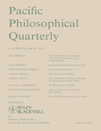
PACIFIC PHILOSOPHICAL QUARTERLY
Challenging Perspectives, Cultivating KnowledgeWelcome to the PACIFIC PHILOSOPHICAL QUARTERLY, a leading journal in the field of philosophy, published by Wiley. With an impressive impact factor and ranked in the top 15% of its category (Q1 in Philosophy), this esteemed journal has become a vital source for scholars and practitioners alike. Established in 1996, the journal presents groundbreaking articles that explore contemporary philosophical issues, ensuring its relevance through converged contributions up to 2024. With robust Scopus rankings, including a position of #122 out of 806 in the Arts and Humanities category, the quarterly serves as a platform for innovative ideas and rigorous debates in the philosophical community. Though it does not offer open access, its insights are invaluable for researchers, professionals, and students eager to deepen their understanding of philosophical discourse.
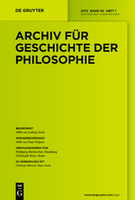
ARCHIV FUR GESCHICHTE DER PHILOSOPHIE
Unveiling the Historical Tapestry of PhilosophyARCHIV FUR GESCHICHTE DER PHILOSOPHIE, published by WALTER DE GRUYTER GMBH, is an esteemed journal that delves into the rich historical landscape of philosophy, tracing conceptual evolution from 1888 through to the present day. With an impact factor reflective of its significance in the field, this journal has achieved a commendable Q2 ranking in Philosophy according to the latest bibliometric assessments. By offering insights into philosophical discourses ranging from the late 19th century to contemporary analysis, the journal serves as an essential resource for scholars, students, and professionals alike. While the journal is not currently Open Access, it remains a critical platform for fostering dialogue and disseminating research in philosophical history, solidifying its reputation as a pivotal source in the humanities. Explore its volumes to gain valuable perspectives on the evolution of philosophical thought and to contribute to an ongoing discourse that spans generations.
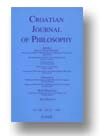
Croatian Journal of Philosophy
Exploring Diverse Perspectives in PhilosophyCroatian Journal of Philosophy is a distinguished academic platform dedicated to the advancement of philosophical discourse, published by KRUZAK D O O. With an ISSN of 1333-1108 and an E-ISSN of 1847-6139, this journal has been a key player in the field since its inception in 2008, continuing to progress through its converged years until 2024. Recognized for its scholarly contributions, it holds a prestigious placement in Q3 within the philosophy category for 2023 and ranks #571 out of 806 in Scopus, reflecting its engagement with a broad spectrum of scholarly discussions and ideas. Though it operates without an Open Access model, the journal remains a vital resource for researchers, professionals, and students who are keen to explore contemporary and traditional philosophical issues from diverse perspectives. The journal's commitment to expanding the boundaries of philosophical inquiry emphasizes the significance of interdisciplinary dialogue, making it a reputable choice for those seeking to deepen their understanding of philosophical thought.
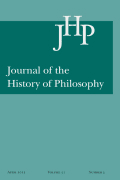
JOURNAL OF THE HISTORY OF PHILOSOPHY
Illuminating the Path from Antiquity to ModernityJOURNAL OF THE HISTORY OF PHILOSOPHY is a premier academic journal dedicated to advancing the study of philosophical thought from antiquity to modernity. Published by Johns Hopkins University Press, this esteemed journal features a range of scholarly articles that delve into the historical context, development, and impact of philosophy across civilizations. With an ISSN of 0022-5053 and an E-ISSN of 1538-4586, it boasts an impressive rank of Q1 in Philosophy as of 2023, recognizing its influence and contribution to the field. The journal, which has been publishing since 1975, offers insights that are invaluable for researchers, professionals, and students dedicated to the exploration of philosophical traditions and their legacies. Although it operates under a subscription model, the rigor and depth of the research published make it an essential resource for anyone interested in philosophical inquiry. With its commitment to scholarly excellence and critical discourse, the JOURNAL OF THE HISTORY OF PHILOSOPHY serves as a vital platform for new ideas and connections in the realm of philosophy.

Journal of the Philosophy of History
Illuminating the Philosophical Dimensions of Our PastThe Journal of the Philosophy of History, published by BRILL, is a premier academic journal that focuses on the interdisciplinary field of philosophy as it pertains to historical study, and it has garnered a reputation for excellence since its inception in 2007. With an ISSN of 1872-261X and an E-ISSN of 1872-2636, the journal is committed to advancing scholarly discourse by publishing innovative research that explores the philosophical underpinnings of historical narratives and methodologies. Based in the Netherlands, the journal ranks in the Q1 category in History and Q2 in the History and Philosophy of Science in 2023, reflecting its significant impact in the field, with a notable Scopus ranking placing it at #263/1760 in History and #79/223 in History and Philosophy of Science. This journal not only serves as a critical resource for researchers and scholars but also encourages engagement from students and professionals seeking to deepen their understanding of the philosophical dimensions of history. Although it operates under a subscription model, the quality and rigor of its scholarly contributions play a pivotal role in shaping ongoing debates and developments in the philosophy of history.
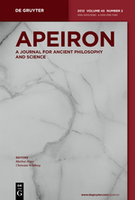
Apeiron-A Journal for Ancient Philosophy and Science
Exploring the Roots of Thought and InquiryApeiron - A Journal for Ancient Philosophy and Science is a distinguished academic journal published by Walter de Gruyter GmbH, based in Berlin, Germany. As an essential platform for scholars in the fields of History and Philosophy of Science and Philosophy, this journal holds a prestigious Q1 ranking in both domains as of 2023, reflecting its significant impact and contribution to these disciplines. With its ISSN 0003-6390 and E-ISSN 2156-7093, Apeiron aims to foster interdisciplinary dialogue by publishing original research, reviews, and critical essays that explore the rich intersections of ancient thought and scientific inquiry. As the journal converges into its fifth year from 2019 to 2024, it offers a vital resource for researchers, professionals, and students seeking to deepen their understanding of classical philosophical traditions and their relevance to contemporary science. Although it operates under a subscription model, the rigorous peer-review process ensures that each publication maintains the highest academic standards, thus solidifying Apeiron's status as a pivotal resource in its field.
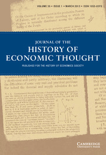
Journal of the History of Economic Thought
Unearthing the Roots of Economic ThoughtThe Journal of the History of Economic Thought, published by Cambridge University Press, stands as a vital contributor to the field of economic history, providing an esteemed platform for scholarly discourse and research since its inception in 1970. With an ISSN of 1053-8372 and an E-ISSN of 1469-9656, this journal features a robust editorial agenda that examines the evolution of economic ideas through a critical and historical lens. Notably, it has achieved a commendable Q2 ranking in both Arts and Humanities and Economics, Econometrics and Finance categories, along with a Q1 ranking in History and Philosophy of Science, highlighting its academic rigor and relevance in contemporary discourse. The journal's commitment to fostering a comprehensive understanding of economic thought positions it as a critical resource for researchers, professionals, and students eager to delve into the intricate ties between economic theories and historical contexts. Although it does not offer open access, the journal continues to inspire and inform scholarship within diverse economic narratives and philosophical inquiries, thus enriching the landscape of economic history.
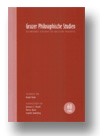
Grazer Philosophische Studien-International Journal for Analytic Philosophy
Challenging Conventional Paradigms Through Rigorous AnalysisGrazer Philosophische Studien - International Journal for Analytic Philosophy, published by BRILL, stands as a pivotal academic outlet in the realm of analytic philosophy. With an esteemed Q1 ranking in the philosophy category for 2023, it reflects high scholarly standards and substantial impact, ranking 161st out of 806 journals in the field. The journal, bearing the ISSN 0165-9227 and E-ISSN 1875-6735, caters to a diverse audience of researchers, professionals, and students, providing a platform for the dissemination of innovative philosophical thought. As it converges its publications from 2011 to 2013 and continues robustly from 2015 to 2024, the journal emphasizes interdisciplinary approaches and encourages contributions that challenge conventional paradigms. Although it currently does not operate under open access, its scholarly articles are crucial for advancing discourse in analytic philosophy, making it an indispensable resource for anyone engaged in rigorous philosophical inquiry.
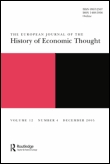
European Journal of the History of Economic Thought
Charting the Course of Economic Thought Through TimeThe European Journal of the History of Economic Thought, published by Routledge Journals, Taylor & Francis Ltd, stands as a pivotal platform for scholars in the interdisciplinary fields of economics, history, and philosophy. With its ISSN 0967-2567 and E-ISSN 1469-5936, this esteemed journal is not only recognized for its Q2 ranking in various categories, including Arts and Humanities and Economics, but it also boasts an impressive HIndex indicating a significant level of academic influence and engagement. With published works spanning from 1993 to 2024, this journal seeks to illuminate the historical context and evolution of economic thought, promoting critical discourse among researchers, professionals, and students alike. Although it does not currently offer open access, the journal remains a crucial resource for those wishing to delve into the intricate relationships between economic theory and historical progression. By fostering a deeper understanding of economic ideas and their implications, the European Journal of the History of Economic Thought plays a vital role in enhancing the scholarship within its domain.